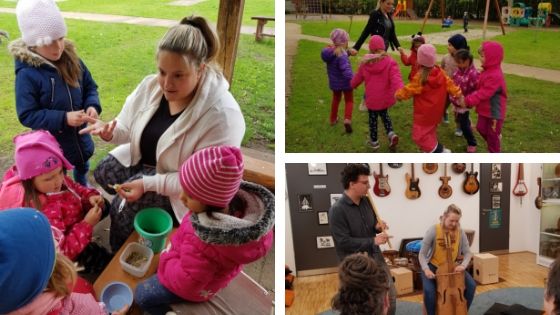Music, rhyme and play inspires UON Early Years students
Date 5.06.2019

Thirteen Early Years Students, at the University of Northampton have just returned from a study trip to Hungary, where they explored the Hungarian approach to Early Childhood Care and Education and the way Hungarian early years teaching and learning works. They spent time with Hungarian children in state funded early childhood settings.
During the study trip the students visited nurseries, kindergartens – which formalises childcare for children from three to six years old – as well as Year One classes of primary schools, at aged seven. Hungarian young children spend far more time in early years education before having to be ready for school, which contrasts starkly with the UK, where the majority of children are in out of home childcare by the time they are a year old, and go to school at the age of four. During the study trip the Northampton students saw first-hand how the Hungarian early years settings teach using rhyme, storytelling and play based teaching methods to expand the country’s young minds.
Eleonora Teszenyi, Senior Lecturer in Education, who organised the trip said: “The Early Years programmes at the University of Northampton offer a global perspective on the first years of babies’ and children’s lives. In Hungary, for example, children tend to spend more time being cared for by family members in their earliest years. State funded early education and care is compulsory from the age of three, and spending three or four years in kindergarten provision means that children have more time to develop the skills they need to be “ready” for school. Although what “ready” is, is defined differently across the globe. This study trip encourages our students to critically reflect on their own practice and to think about how they might utilise pedagogical approaches other countries excel at, within their own placements across Northamptonshire, and then when they graduate and are working.”
As part of the trip, Northampton students spend time in Hungarian nurseries, kindergartens and schools – breaking down the language barrier and interacting with the children through the language of play. In Hungary, there are examples of educating young children aged 3-6 together, which enables families to have siblings in the same kindergarten groups, and for children, that means they play with and learn from peers of a wider age range. That gives some interesting points in relation to child development and early years pedagogy for the UK students to consider.
Talking about the trip, one student, said: “It was just incredible seeing a different approach and it has really influenced parts of my practice. If, like me, you are one of the more mature students studying for your foundation degree, you will consider the juggling act that is University, work, family and running a home, and think can I really manage a five-day trip to Hungary as well? Well the answer is, yes. To see for yourself another countries approach to early years was a real eye opener. You can observe differences and similarities in methodology and judge for yourself the aspects that you like and dislike about their practice, this then allows you to truly reflect on your own approach.”